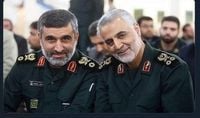In a dramatic escalation of hostilities between Iran and Israel, the past days have seen a series of deadly airstrikes, retaliations, and significant military losses on both sides. The conflict reached a new peak on the night of June 12, 2025, when an Israeli air attack targeted a position of the resistance front, resulting in the martyrdom of Brigadier General Amir Ali Hajizadeh, commander of the Islamic Revolutionary Guard Corps (IRGC) Aerospace Force, according to multiple official sources including Bulletin News and Tasnim News Agency.
General Hajizadeh was a pivotal figure in Iran’s military establishment, especially noted for his instrumental role in developing the country's missile and aerospace capabilities. He was a key architect in strengthening Iran’s deterrent power and had long been a frontline strategist within the axis of resistance across the region. His death marks a significant blow to Iranian military leadership and has been met with widespread condolences from high-ranking military and political officials, as well as resistance figures throughout the Middle East.
The attack that claimed General Hajizadeh's life occurred beyond Iran’s borders during one of his regional missions, though the exact location and further details remain undisclosed by official sources. The Islamic Revolutionary Guard Corps has promised forthcoming announcements regarding the funeral arrangements for the fallen commander.
Simultaneously, Iran launched extensive retaliatory strikes targeting Israeli cities, including missile attacks on Tel Aviv and Jerusalem, as reported by Tasnim News Agency. These missile strikes were part of a broader response to the Israeli air raids that had already resulted in considerable casualties among Iranian military personnel and civilians. Two Israeli fighter jets involved in the attacks were reportedly targeted by Iranian forces, underscoring the intensity of the conflict.
Adding to the tension, a letter from Major General Hossein Pakpour, the newly appointed IRGC commander, was sent to Iran’s Supreme Leader, promising that “the gates of hell will soon open for the child-killing Israeli regime,” signaling Tehran’s resolve to continue its military campaign against Israel.
Among the confirmed casualties are several senior military figures, including Major General Mohammad Hossein Bagheri, Chief of Staff of the Armed Forces, and Major General Gholamali Rashid, a senior commander. While the official state news agency IRNA initially reported that Bagheri was unharmed and actively present in the military operations room, Fars News Agency later confirmed his martyrdom, illustrating the fog of war and information warfare surrounding the conflict.
Similarly, the martyrdom of Major General Hossein Salami, Commander-in-Chief of the IRGC, has been verified, alongside General Davood Sheikhiyan, commander of the IRGC Aerospace Air Defense. These losses represent a severe depletion of Iran’s top military leadership in the face of Israeli aggression.
Despite widespread rumors and misinformation, Tasnim News Agency and other Iranian outlets have firmly denied reports of the deaths of other commanders such as General Ali Fadavi and have clarified that these leaders remain active and are directing the ongoing retaliatory operations against Israel. The spread of false information, often propagated by anti-revolutionary media and accounts linked to the Zionist regime, appears aimed at undermining Iranian public morale and gathering intelligence on the status of military commanders targeted in the attacks.
On the political front, the conflict has drawn international attention. Iranian officials have communicated with Russian President Vladimir Putin, assuring him that Israeli aggressions will receive appropriate responses. Meanwhile, former U.S. President Donald Trump has weighed in, claiming he had given Iran a 60-day opportunity to reach an agreement, which has now passed, but suggesting Iran might be given another chance.
Tragically, the conflict has also claimed the lives of civilians and non-combatants, including Tehranchi and his wife, along with four members of their protection team. These casualties add to the human cost of the ongoing hostilities and deepen the animosity between the two nations.
Amidst the chaos, Iran’s Supreme Leader has appointed Seyyed Abdolrahim Mousavi as the new Chief of Staff of the Armed Forces, signaling a reorganization of military leadership in response to the crisis. This move aims to consolidate command and ensure coordinated retaliatory actions against Israeli forces.
The situation remains highly volatile, with the Iranian leadership vowing continued resistance and retaliation. The confirmed deaths of several top commanders underscore the severity of the conflict and the high stakes involved. For the people of Iran and the wider region, these events mark a perilous chapter in the long-standing tensions that have defined Middle Eastern geopolitics for decades.
As missiles continue to strike major Israeli cities and Iran mourns its fallen generals, the international community watches closely, wary of further escalation that could engulf the region in even wider conflict. The coming days will be critical in determining whether diplomacy can intervene or if the cycle of violence will deepen further.


